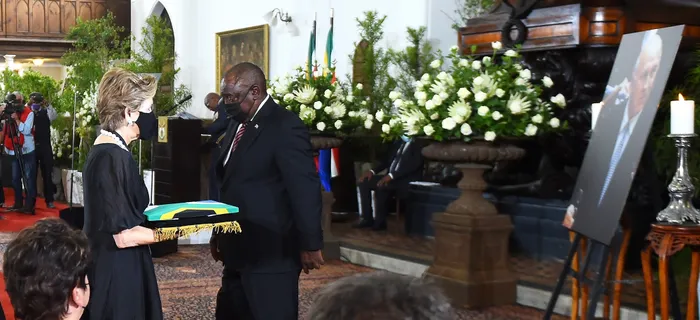President Ramaphosa pays tribute to FW de Klerk at memorial service

Elita de Klerk receives the national flag from President Cyril Ramaphosa after he delivered the eulogy at the State Memorial Service for her late husband and apartheid-era president, FW de Klerk. Picture: Phando Jikelo/African News Agency
CAPE TOWN - President Cyril Ramaphosa has described SA’s last apartheid president FW de Klerk as courteous, respectful and committed.
While the injustices of the past should not be forgotten, Ramaphosa emphasised that De Klerk played a role in the country’s democratic transition.
Ramaphosa delivered the eulogy at De Klerk’s state memorial service at the Groote Kerk in Cape Town on Sunday
The president reflected on the day that the democratic Constitution was signed into law by former president Nelson Mandela in Sharpeville on December 10, 1996, and said De Klerk was seated not too far from Mandela.
“His presence on that day, to bear witness to the signing of the Constitution that would be the foundation of a free South Africa, was deeply significant. His presence was a measure of the changes that had taken place in our country in the passage of only a few years.
“Some of the relatives of the 69 people who were massacred at Sharpeville were also seated in the audience together with FW de Klerk. It must have been a sombre moment for him.
It must also have been a moment of deep reflection,” Ramaphosa said.
The president made reference to a statement made by Mandela in which he described De Klerk as a “man of integrity”. He said that in remembering the courage of his convictions, the last apartheid president’s contribution and his legacy still remained contested.
“We can neither ignore, nor must we ever seek to dismiss, the anger, the pain and the disappointment of those who recall the place FW de Klerk occupied in the hierarchy of an oppressive state. We must never forget the injustices of the past. Change did not come soon enough for the many South Africans who lost their lives at the hands of a cruel regime, but change did nonetheless come,” Ramaphosa said.
Minister in the Presidency Mondli Gungubele described De Klerk as an “impactful and indelible figure in the history of our democracy”. “We are aware that this event is the subject of debate and different opinions such as our robust democracy – a democracy which has given all of us a voice.”
Referencing his father’s public apology for apartheid, his son Jan de Klerk, said an apology rejected would be the rejecters’ cross to carry.
“He often told me interaction with people should be based on humanity, respect, justice and an attitude of earning something and deserving nothing,” his son said.
A handful of protesters gathered outside the memorial service, demanding justice for those who were killed under the apartheid regime. They held placards written “justice denied”, and called on the government to meet with the families of victims.
Cape Times
Related Topics: